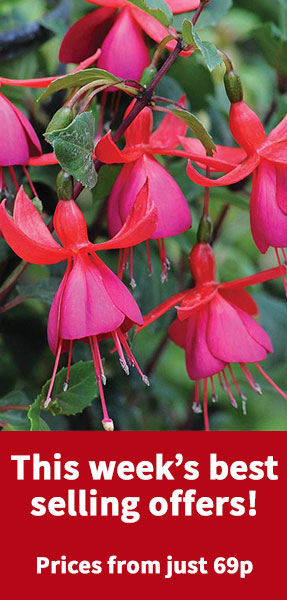
F2 and Open Pollinated Varieties
The majority of varieties in the seed catalogues are open pollinated and F2 hybrid varieties. This article explains what these terms mean and how this can help you get the best value for money.
It's difficult to tell from the term F2 hybrid whether the plants are an improvement over the F1s or second class versions of them. In fact, it's quite straightforward. In its simplest form, an F2 is the result of saving seed from an Fl hybrid; in other words, it's the next generation.
As I described in a previous article, an F1 hybrid is produced from two pure lines but these could have been developed from a number of parents at various stages and if seed is sown from F1 hybrid plants it is quite possible that you will see not only 'parents' but 'grandparents' in the resulting plants.
Nevertheless in very many instances and in spite of what some seed catalogues may say, F2s will sometimes produce an acceptably high percentage of plants almost identical to the F1 hybrids from which they derive. It could be that the plants are perhaps a little later, slightly taller, and probably lack the uniformity, but nevertheless they produce a very acceptable result.
F2s will also retain a large slice of their parents' vigour and even the disease resistance and other characteristics the parent plants have been bred for. They are also cheaper because the F1 hybrid plants which produce the seed can be grown in a field and mechanically harvested. You will recall that to create F1 hybrid seed each plant has to be hand pollinated and each seed pod carefully harvested. The simple mechanised method of seed production means that seed is cheaper and you get more for your money. Examples of F2 varieties in catalogues include Primula malacoides 'First Love', Calendula 'Neon', Petunia 'Rainbow' and Geranium 'Fleuriste'.
Open Pollinated Varieties
Open pollinated varieties of seed, sometimes referred to as OPs, are plants which are either self pollinating or cross pollinating with their neighbours but lack the uniformity of either an F1 hybrid or even an F2. They are not subject to the germination fluctuations occasionally found in F1s.
If you happen to see an especially nice plant of, say, an Antirrhinum it is quite simple to save a seed pod, sow the seed the following year and get a plant exactly the same. They are therefore cheap, they can be grown easily on a large scale, mechanically harvested, and as it is usually more robust, cleaned in volume.
Many of our open pollinated varieties of seed today, particularly the flowers, are the result of nothing more than careful selection. Some of our latest varieties are simply the result of plants which have been selected from a large number and grown on in isolation. Sometimes one will see, for example, a delphinium which is very short. There is obviously a good chance that if the seed is saved from this plant, in the next generation you will have a good sprinkling of early flowering short plants and, quite possibly, a range of colours. By continuing to select these plants you will finally establish a crop that is almost entirely early and short. This is probably the earliest and most simple attempt at plant breeding.
For instance, the Salvia 'Splendissima', which is exciting a lot of interest, especially in America, is the result of seven generations of selecting for exactly the characteristics that are required. In other words, each seed now produces a very nearly identical plant and without the expense of creating an F1 or F2.
Examples of familiar open pollinated varieties include: Chrysanthemum 'Court Jesters', Digitalis 'Excelsior Hybrids', Eschscholzia 'Monarch Mixed' and Alyssum 'Carpet of Snow'.
Do not be misled by the publicity which may tell you that only F1 or F2 varieties are worth growing. They are certainly good but an open pollinated variety can still stand on its own feet and strong new plants are still being produced from open pollinated selections.
Remember, you get what you pay for. If you want the best, it's and F1; if you want nearly as good at a better price, it's an F2; if you want good reliable plants at the keenest prices, go for open pollinated varieties. The choice is yours.
Lawrence D. Hills is the founder of the Henry Doubleday Foundation (now Garden Organic) and a renowned champion of organic gardening techniques.
Source of article
Growing From Seed - Spring 1987 Vol. 1 Number 2
© The Seed Raising Journal from Thompson & Morgan
Sign Up For Exclusive Special Offers




© 2025 Thompson & Morgan. All rights reserved. A division of Branded Garden Products Limited.




